Business Intelligence (BI) Developers play a crucial role in transforming data into insights that drive business decisions. They bridge the gap between data and strategic decision-making, ensuring that organizations can act on reliable, up-to-date information.
Skills required for a BI Developer include proficiency in database technologies, expertise in data analysis and reporting tools, and a strong understanding of data warehousing principles. Additionally, they must possess critical thinking and problem-solving abilities.
Candidates can write these abilities in their resumes, but you can’t verify them without on-the-job Business Intelligence Developer skill tests.
In this post, we will explore 9 essential Business Intelligence Developer skills, 11 secondary skills and how to assess them so you can make informed hiring decisions.
Table of contents
9 fundamental Business Intelligence Developer skills and traits
The best skills for Business Intelligence Developers include SQL, Data Warehousing, ETL Processes, Data Modeling, Reporting Tools, Data Analysis, Scripting Languages, Database Management and Business Acumen.
Let’s dive into the details by examining the 9 essential skills of a Business Intelligence Developer.
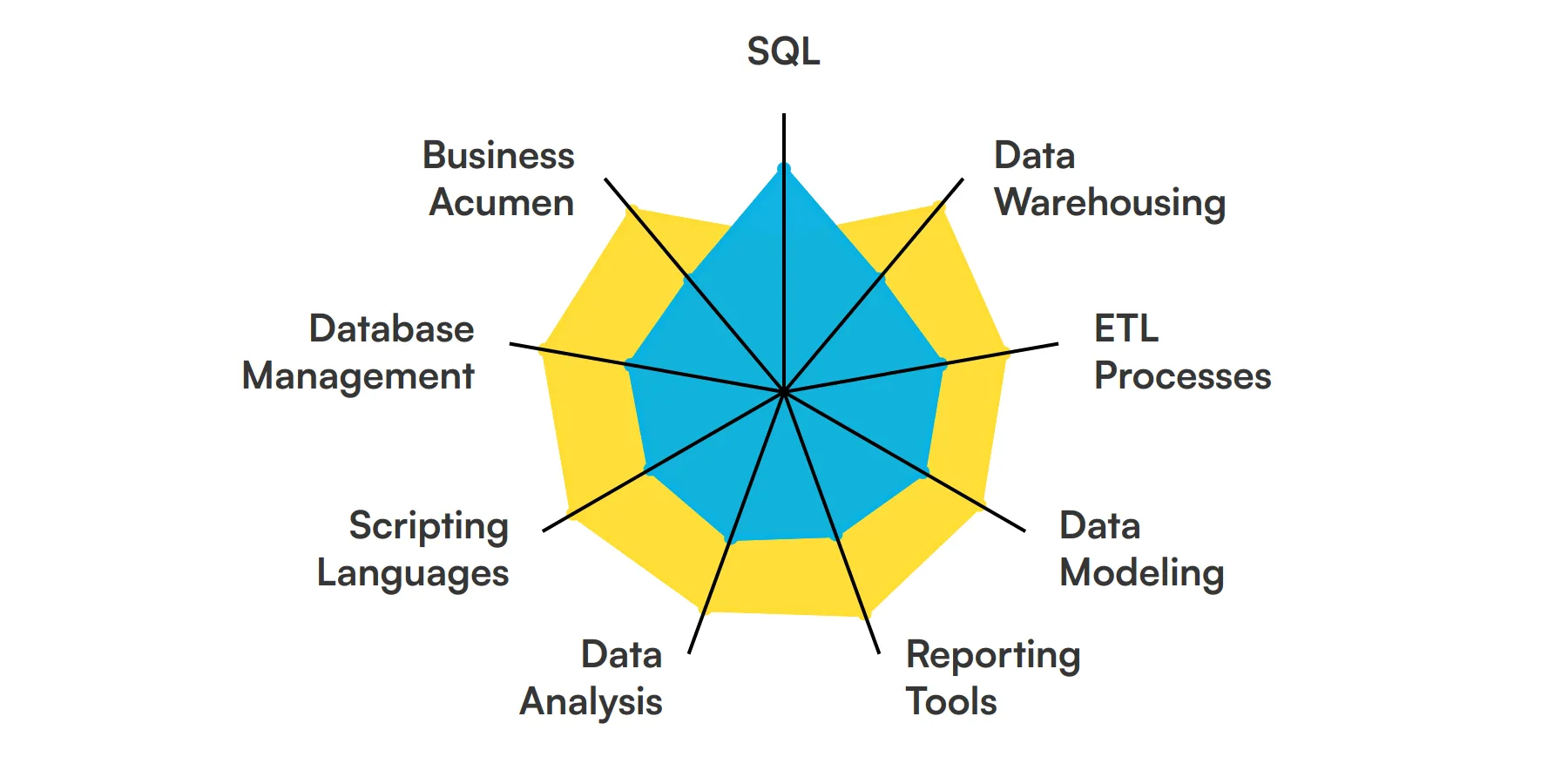
SQL
SQL is the backbone of data manipulation and querying in business intelligence. A Business Intelligence Developer uses SQL to extract, transform, and load data from various sources into a data warehouse. Mastery of SQL allows for efficient data retrieval and complex query execution, which is crucial for generating accurate reports and insights.
For more insights, check out our guide to writing a SQL Developer Job Description.
Data Warehousing
Data warehousing involves the storage and management of large volumes of data from different sources. A Business Intelligence Developer designs and maintains data warehouses to ensure data is organized and accessible for analysis. This skill is essential for creating a centralized repository that supports business decision-making.
ETL Processes
ETL (Extract, Transform, Load) processes are critical for moving data from source systems to a data warehouse. A Business Intelligence Developer designs and implements ETL workflows to ensure data is accurately and efficiently transferred. This skill ensures that data is clean, consistent, and ready for analysis.
Check out our guide for a comprehensive list of interview questions.
Data Modeling
Data modeling involves creating abstract representations of data objects and their relationships. A Business Intelligence Developer uses data modeling to design databases that support business processes and reporting needs. This skill helps in structuring data in a way that enhances query performance and data integrity.
Reporting Tools
Proficiency in reporting tools like Power BI, Tableau, or Looker is essential for creating interactive and insightful dashboards. A Business Intelligence Developer uses these tools to visualize data, making it easier for stakeholders to understand trends and make informed decisions.
For more insights, check out our guide to writing a Tableau Developer Job Description.
Data Analysis
Data analysis involves examining datasets to uncover patterns, correlations, and insights. A Business Intelligence Developer uses analytical skills to interpret data and provide actionable recommendations. This skill is crucial for transforming raw data into meaningful information that drives business strategies.
Scripting Languages
Knowledge of scripting languages like Python or R is valuable for automating data processing tasks and performing advanced analytics. A Business Intelligence Developer uses these languages to write scripts that enhance data manipulation and analysis capabilities.
Database Management
Database management skills are necessary for maintaining and optimizing database systems. A Business Intelligence Developer ensures that databases are running efficiently, data is secure, and backups are in place. This skill is vital for the reliability and performance of data-driven applications.
Check out our guide for a comprehensive list of interview questions.
Business Acumen
Understanding the business context is crucial for a Business Intelligence Developer. This skill involves knowing the industry, business processes, and key performance indicators. It helps in aligning data solutions with business goals and providing relevant insights.
11 secondary Business Intelligence Developer skills and traits
The best skills for Business Intelligence Developers include Data Visualization, Cloud Platforms, Version Control, APIs, Data Governance, Project Management, Statistical Analysis, Data Integration, Problem-Solving, Communication and Time Management.
Let’s dive into the details by examining the 11 secondary skills of a Business Intelligence Developer.
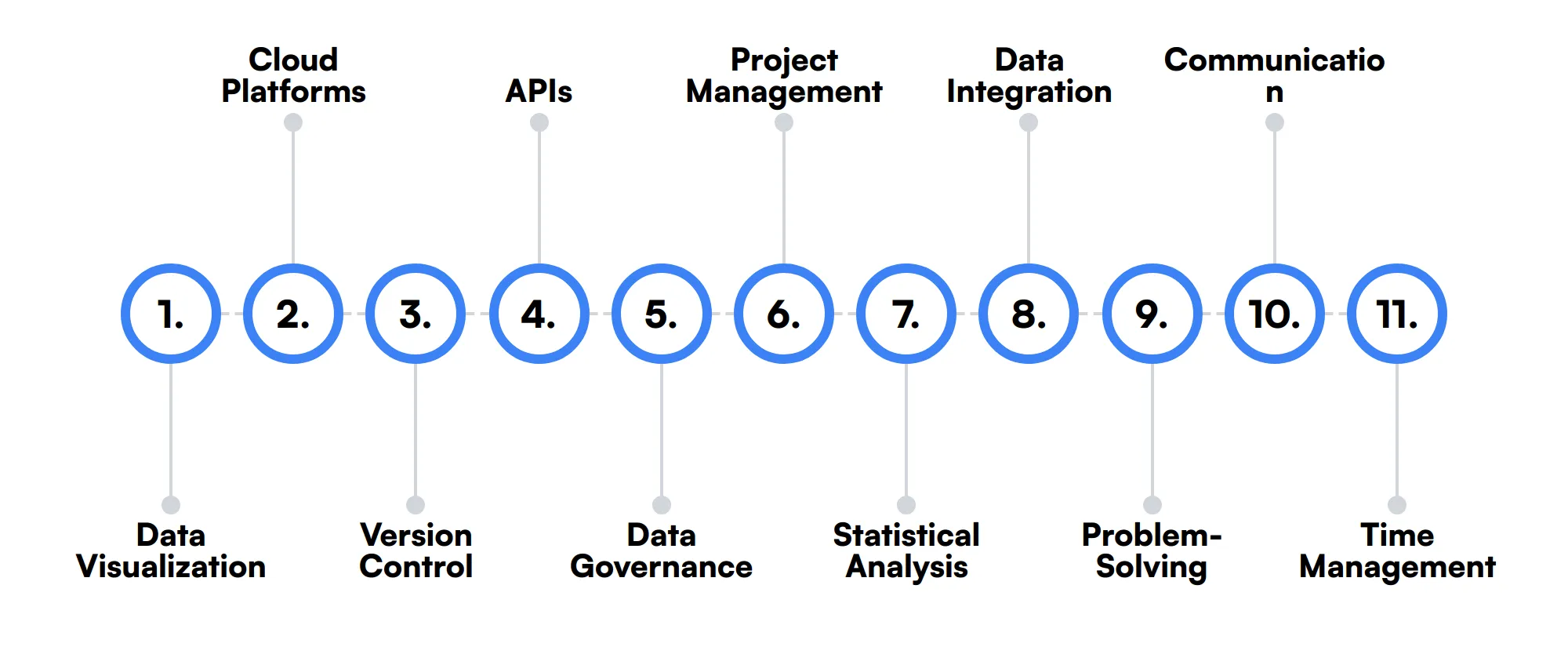
Data Visualization
Creating compelling visual representations of data helps in communicating insights effectively. This skill involves using charts, graphs, and other visual tools to make data understandable at a glance.
Cloud Platforms
Familiarity with cloud platforms like AWS, Azure, or Google Cloud is beneficial for managing data storage and processing in a scalable environment. This skill supports modern data warehousing and analytics solutions.
Version Control
Using version control systems like Git helps in managing changes to code and collaborating with other developers. This skill ensures that code is tracked, and changes can be rolled back if necessary.
APIs
Knowledge of APIs (Application Programming Interfaces) is useful for integrating different systems and accessing external data sources. This skill allows a Business Intelligence Developer to pull in data from various applications seamlessly.
Data Governance
Understanding data governance principles ensures that data is managed properly, with a focus on data quality, privacy, and compliance. This skill is important for maintaining the integrity and security of data.
Project Management
Basic project management skills help in planning, executing, and monitoring BI projects. This skill ensures that projects are completed on time, within scope, and meet the desired objectives.
Statistical Analysis
Knowledge of statistical methods enhances the ability to perform deeper data analysis. This skill is useful for identifying trends, making predictions, and validating hypotheses.
Data Integration
Data integration skills involve combining data from different sources to provide a unified view. This is crucial for comprehensive analysis and reporting.
Problem-Solving
Strong problem-solving skills are necessary for troubleshooting data issues and optimizing processes. This skill helps in identifying root causes and implementing effective solutions.
Communication
Effective communication skills are important for explaining technical concepts to non-technical stakeholders. This skill ensures that insights and recommendations are clearly understood and acted upon.
Time Management
Good time management skills help in prioritizing tasks and meeting deadlines. This is essential for handling multiple projects and ensuring timely delivery of BI solutions.
How to assess Business Intelligence Developer skills and traits
Assessing the skills and traits of a Business Intelligence (BI) Developer can be a challenging task. It's not just about knowing the technical skills but also understanding how well they can apply these skills to solve real-world business problems. While resumes can provide a list of qualifications and experiences, they often fall short in demonstrating a candidate's true proficiency and practical abilities.
To effectively evaluate a BI Developer, you need to look beyond the surface. This involves assessing their expertise in SQL, Data Warehousing, ETL Processes, Data Modeling, Reporting Tools, Data Analysis, Scripting Languages, Database Management, and Business Acumen. Skills-based hiring practices, such as talent assessments, offer a more reliable way to gauge a candidate's competencies.
Using tools like Adaface on-the-job skill tests can significantly streamline this process, providing a 2x improved quality of hires and an 85% reduction in screening time. These assessments are designed to test the practical application of a candidate's skills, ensuring that you find the right fit for your BI Developer role.
Let’s look at how to assess Business Intelligence Developer skills with these 6 talent assessments.
SQL Online Test
Our SQL Online Test evaluates a candidate's ability to design and build relational databases and tables from scratch, apply CRUD options, write queries and subqueries to filter data, and create indexes for faster SQL queries.
The test assesses their understanding of creating databases, tables, and performing CRUD operations. It also covers joins, subqueries, conditional expressions, views, indexes, string functions, mathematical functions, timestamps, locks, transactions, scale, and security.
Successful candidates demonstrate proficiency in database design, query optimization, and data manipulation, ensuring they can handle complex SQL tasks and maintain database performance.

Data Warehouse Online Test
Our Data Warehouse Online Test uses scenario-based multiple-choice questions to evaluate candidates on their expertise in data warehousing, including designing, building, and maintaining warehouses, databases, and data marts.
The test covers SQL basics, CRUD queries, subqueries, joins, ETL fundamentals, ER diagrams, data modeling, fact tables, and normalization. It assesses the candidate's ability to handle data warehousing tasks effectively.
Candidates who perform well show a strong grasp of data warehousing principles, including data modeling and ETL processes, ensuring they can manage and optimize data storage solutions.
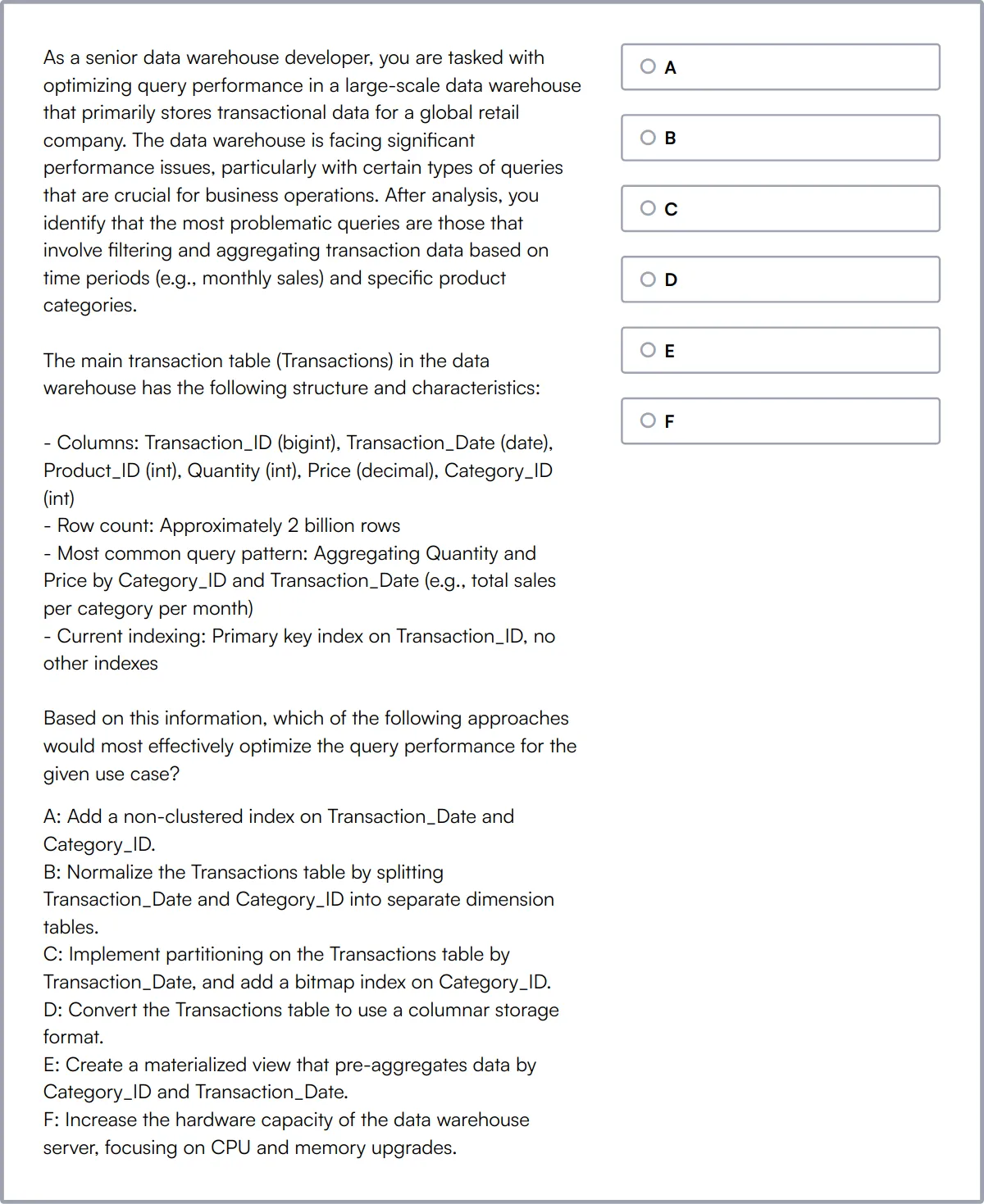
Informatica Online Test
Our Informatica Online Test evaluates a candidate's ability to use PowerCenter for ETL. It assesses their skills in data synchronization, replication tasks, designing data transformations, and managing source/target definitions.
The test covers data warehousing, ETL, data integration, relational database CRUD operations, database joins, mapplets, parameterization, workflows, sessions, tasks, and transformations.
High-scoring candidates demonstrate proficiency in using Informatica PowerCenter for complex ETL processes, ensuring they can handle data integration and transformation tasks efficiently.
Data Modeling Skills Test
Our Data Modeling Skills Test evaluates a candidate's knowledge and abilities in database design, SQL, ER diagrams, normalization, relational schema, data integrity, data mapping, data validation, and data transformation.
The test covers data modeling, database design, SQL, ER diagrams, normalization, relational schema, data integrity, data mapping, data validation, and data transformation.
Candidates who excel in this test show a strong understanding of database design principles and data integrity, ensuring they can create and maintain robust data models.
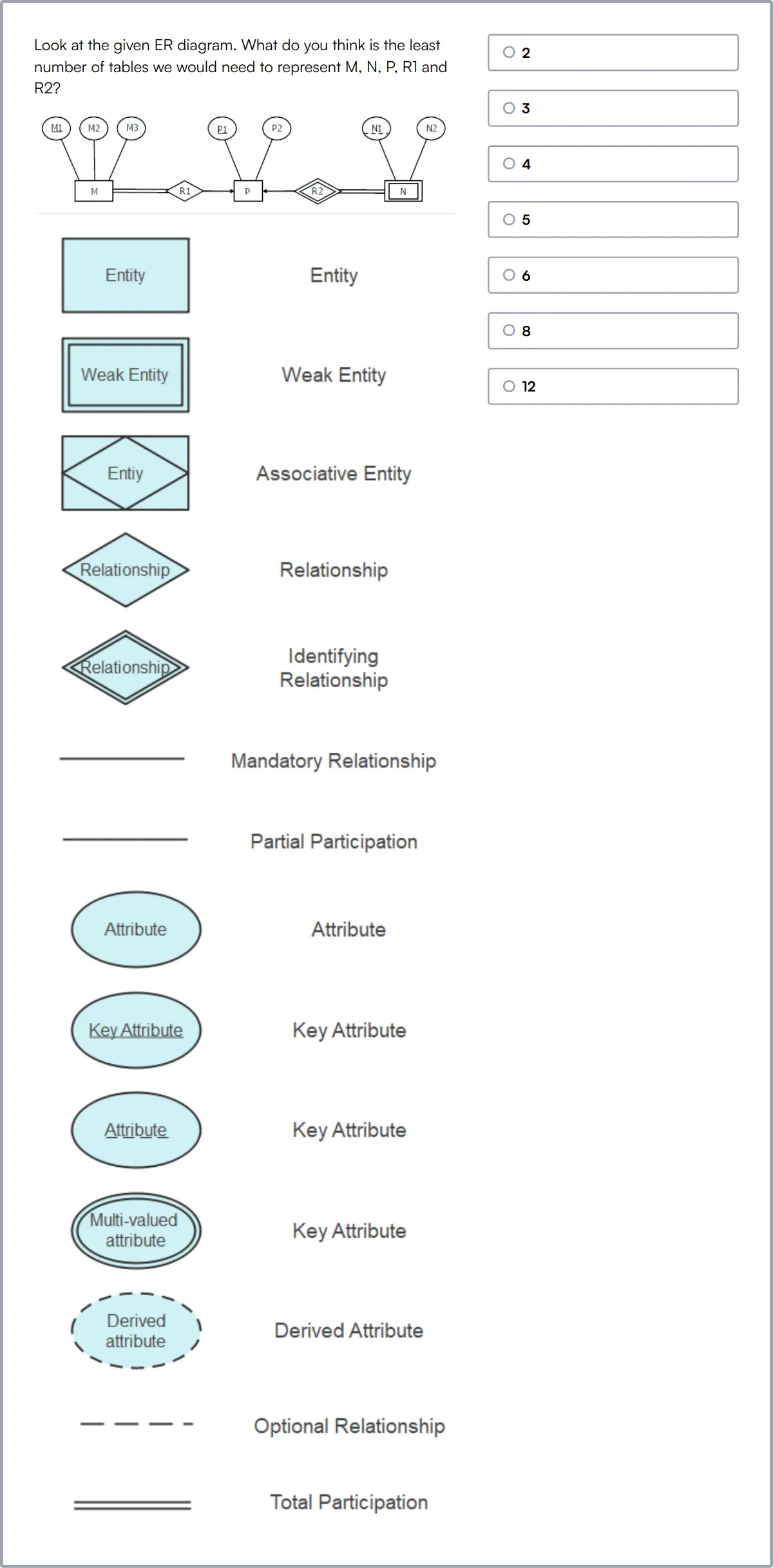
SSRS Online Test
Our SSRS Online Test uses scenario-based MCQs to evaluate candidates on their knowledge of SSRS, including their proficiency in working with report design, data visualization, data sources, and report server management.
The test covers SSRS security management, reporting service tools, report configuration, Internet Information Services, and report server database.
Successful candidates demonstrate proficiency in SSRS, ensuring they can design and develop reports that meet business requirements and integrate SSRS with other Microsoft technologies.
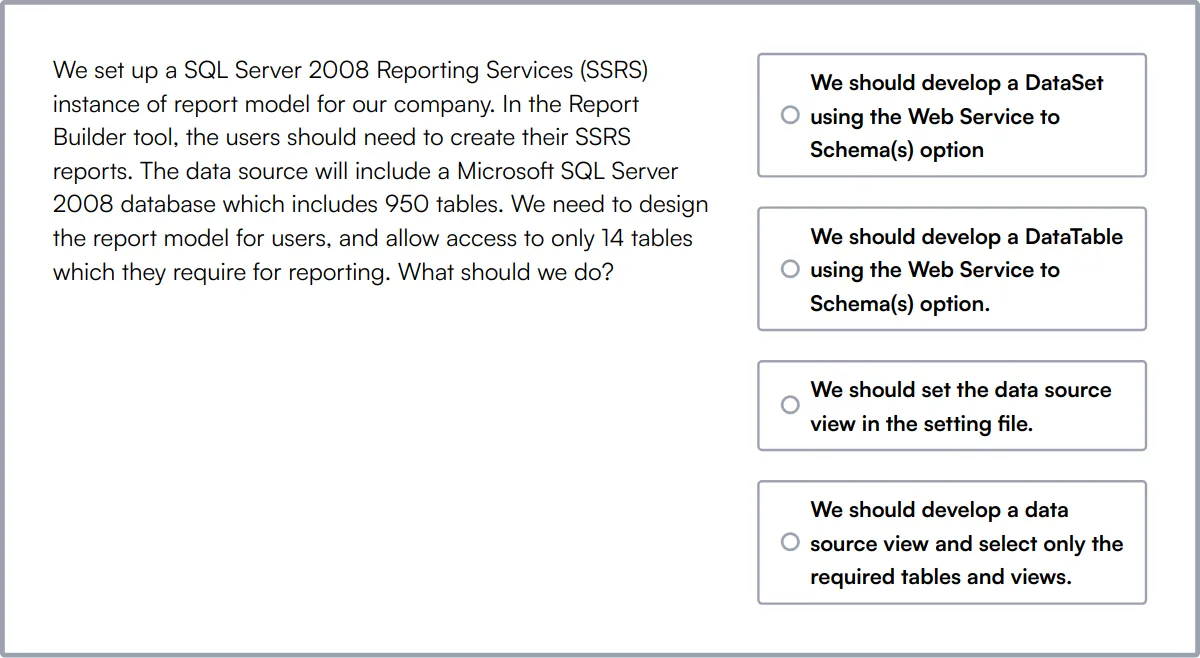
Data Analysis Test
Our Data Analysis Test assesses a candidate's ability to handle, modify, analyze, and interpret data. The test uses scenario-based MCQs to screen for experience with analyzing data to find possible outcomes, detect anomalies, and extract meaningful insights.
The test covers basics of data modeling, data analysis, business analysis fundamentals, data interpretation, data queries and databases, data operations, data investigations, and popular data tools like Excel.
Candidates who perform well demonstrate strong analytical skills and the ability to interpret data accurately, ensuring they can provide valuable insights and support data-driven decision-making.

Summary: The 9 key Business Intelligence Developer skills and how to test for them
| Business Intelligence Developer skill | How to assess them |
|---|---|
| 1. SQL | Evaluate proficiency in querying and managing relational databases. |
| 2. Data Warehousing | Assess ability to design and implement data storage solutions. |
| 3. ETL Processes | Check skills in extracting, transforming, and loading data. |
| 4. Data Modeling | Gauge capability in structuring data for optimal use. |
| 5. Reporting Tools | Determine proficiency in creating and managing business reports. |
| 6. Data Analysis | Evaluate skills in interpreting and analyzing data sets. |
| 7. Scripting Languages | Assess ability to automate tasks using scripts. |
| 8. Database Management | Check skills in maintaining and optimizing database systems. |
| 9. Business Acumen | Gauge understanding of business operations and strategy. |
Business Objects Online Test
Business Intelligence Developer skills FAQs
What SQL skills should a Business Intelligence Developer have?
A BI Developer should be proficient in writing complex queries, optimizing query performance, and understanding database schemas. Familiarity with SQL Server, MySQL, or PostgreSQL is often required.
How can I assess a candidate's experience with Data Warehousing?
Ask about their experience with data warehousing concepts like star schema, snowflake schema, and their use of tools like Amazon Redshift, Google BigQuery, or Snowflake.
What are key ETL skills to look for in a BI Developer?
Look for experience with ETL tools like Informatica, Talend, or SSIS. Assess their ability to design, implement, and maintain ETL pipelines.
How important is Data Modeling for a BI Developer?
Data modeling is crucial for structuring data efficiently. Assess their knowledge of ER diagrams, normalization, and dimensional modeling techniques.
Which Reporting Tools should a BI Developer be familiar with?
Common tools include Tableau, Power BI, and Looker. Evaluate their ability to create interactive dashboards and reports.
How can I evaluate a candidate's Data Analysis skills?
Ask for examples of past projects where they analyzed data to derive insights. Look for proficiency in statistical analysis and data interpretation.
What scripting languages are useful for a BI Developer?
Python and R are commonly used for data manipulation and analysis. Assess their ability to write scripts for data cleaning and automation.
Why is Business Acumen important for a BI Developer?
Business acumen helps BI Developers understand the context of their data. Evaluate their ability to align data insights with business goals.

40 min skill tests.
No trick questions.
Accurate shortlisting.
We make it easy for you to find the best candidates in your pipeline with a 40 min skills test.
Try for freeRelated posts
Free resources



